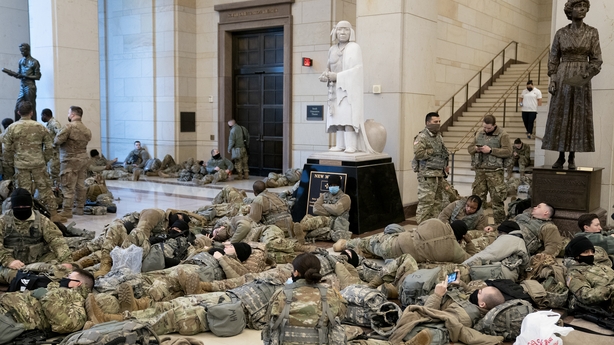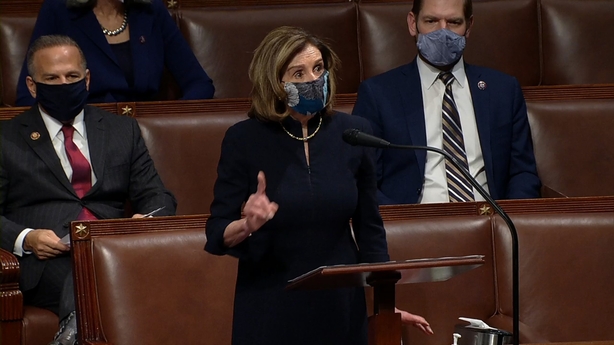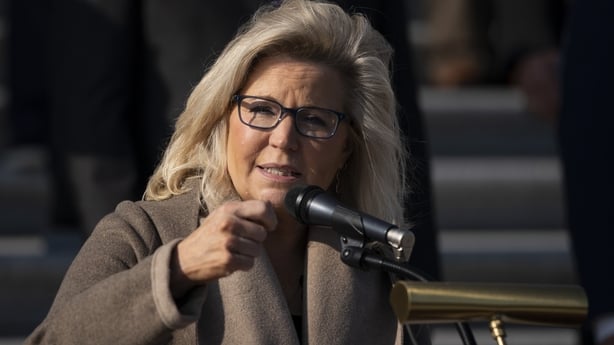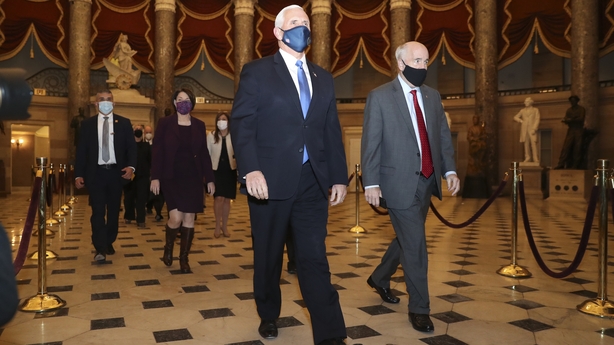A majority of the House of Representatives has voted to make Donald Trump the first US president to be impeached twice, formally charging him with inciting an insurrection just a week after a violent mob of his supporters stormed the Capitol.
The vote in the Democratic-controlled House was 232-197 following a deadly assault on American democracy, with ten Republicans joining Democrats in backing impeachment.
President Trump has released a video on the White House Twitter account in which he did not mention impeachment at the same time as House Speaker Nancy Pelosi was signing the article of impeachment against him.
Instead he focused his remarks on the violence at the Capitol on 6 January, saying: “I want to be very clear, I unequivocally condemn the violence that we saw last week. Violence and vandalism have absolutely no place in our country and no place in our movement.”
— The White House (@WhiteHouse) January 13, 2021
The impeachment article now will go to the Senate for a trial.
But it appears unlikely the Republican president will be ousted before his four-year term ends and Democratic President-elect Joe Biden is inaugurated next Wednesday.
The US Senate’s Republican majority leader said that the Senate cannot conduct a “fair or serious” trial of Mr Trump in the short time frame before he leaves office next week.
“Given the rules, procedures, and Senate precedents that govern presidential impeachment trials, there is simply no chance that a fair or serious trial could conclude before President-elect (Joe) Biden is sworn in next week,” Mitch McConnell said in a statement.
But “even if the Senate process were to begin this week and move promptly, no final verdict would be reached until after President Trump had left office,” he added.
He noted that the three previous impeachment trials – of Andrew Johnson in 1868, Bill Clinton in 1999 and Mr Trump last year – lasted 83 days, 37 days, and 21 days respectively.
Read more:
Impeachment of a US president – how it works
How security failures enabled mob to storm US Capitol
Mr McConnell has said he will not reconvene the chamber, currently in recess, before its scheduled resumption on 19 January, one day before the inauguration.
But the chamber’s top Democrat, Chuck Schumer, stressed that Mr McConnell could begin a trial “immediately” if he chose to reconvene for an emergency session. If not, the process could launch after Mr Biden’s inauguration.
“But make no mistake, there will be an impeachment trial in the United States Senate,” Mr Schumer said in a statement.
“There will be a vote on convicting the president for high crimes and misdemeanours, and if the president is convicted, there will be a vote on barring him from running again.”
The House passed a single article of impeachment – a formal charge – accusing Mr Trump of “incitement of insurrection,” focused upon an incendiary speech he delivered to thousands of supporters shortly before the pro-Trump mob rampaged through the Capitol.
The mob disrupted the formal certification of Mr Biden’s victory over Mr Trump in the 3 November election, sent politicians into hiding and left five people dead, including a police officer.
During his speech, Mr Trump repeated false claims that the election was fraudulent and exhorted supporters to march on the Capitol.

With a large presence of rifle-carrying National Guard troops inside and outside the Capitol, an emotional debate unfolded in the same House chamber where politicians had crouched under chairs and donned gas masks last week as rioters clashed with police officers outside the doors.
“The president of the United States incited this insurrection, this armed rebellion against our common country,” Speaker Nancy Pelosi, a Democrat, said on the House floor before the vote.
“He must go. He is a clear and present danger to the nation that we all love.”

No US president ever has been removed from office through impeachment.
The impeachment comes at a time of gaping political divisions in a pandemic-weary United States near the end of a tumultuous presidency in which Mr Trump governed with a right-wing populist message preaching “America First.”
Democratic congressman Julian Castro, a former presidential candidate, called Mr Trump “the most dangerous man to ever occupy the Oval Office.”
Congresswoman Maxine Waters accused Mr Trump of wanting civil war and fellow Democrat Jim McGovern said the president “instigated an attempted coup”.
Some Republicans argued that the impeachment drive was a rush to judgment that bypassed the customary deliberative process such as hearings and called on Democrats to abandon the effort for the sake of national unity and healing.
“Impeaching the president in such a short time frame would be a mistake,” said Kevin McCarthy, the House’s top Republican.
“That doesn’t mean the president is free from fault. The president bears responsibility for Wednesday’s attack on Congress by mob rioters.”
Mr Trump’s closest allies, such as Ohio Republican Jim Jordan, went further, accusing Democrats of recklessly acting out of pure political interest.
“This is about getting the president of the United States,” said Mr Jordan, who received the Presidential Medal of Freedom from Mr Trump in a private White House ceremony this week.
“It’s always been about getting the president, no matter what. It’s an obsession.”

A handful of Republicans backed impeachment, including Liz Cheney, the No. 3 House Republican.
“I am not choosing a side, I’m choosing truth,” Republican Jamie Herrera Beutler said in announcing her support for impeachment, drawing applause from Democrats. “It’s the only way to defeat fear.”
In a break from standard procedure, Republican House leaders refrained from urging their members to vote against impeachment, calling the vote a matter of individual conscience.
The Capitol siege raised concerns about political violence in the United States once considered all but unthinkable.
The FBI has warned of armed protests planned for Washington and all 50 US state capitals ahead of Mr Biden’s inauguration.
Mr Trump urged his followers to remain peaceful, saying in a statement, “I urge that there must be NO violence, NO lawbreaking and NO vandalism of any kind. That is not what I stand for, and it is not what America stands for.”
Impeachment is a remedy devised by America’s 18th century founders to enable Congress to remove a president who has, according to the Constitution, committed “treason, bribery or other high crimes and misdemeanours.”

If Mr Trump is removed, Vice President Mike Pence would become president and serve out his term.
The House impeached Mr Trump after he ignored calls for his resignation and Mr Pence rebuffed Democratic demands to invoke a constitutional provision to remove the president.
The House previously voted to impeach Mr Trump in December 2019 on charges of abuse of power and obstruction of Congress stemming from his request that Ukraine investigate Mr Biden and his son Hunter ahead of the election, as Democrats accused him of soliciting foreign interference to smear a domestic political rival.
The Senate in February 2020 voted to keep Mr Trump in office.
